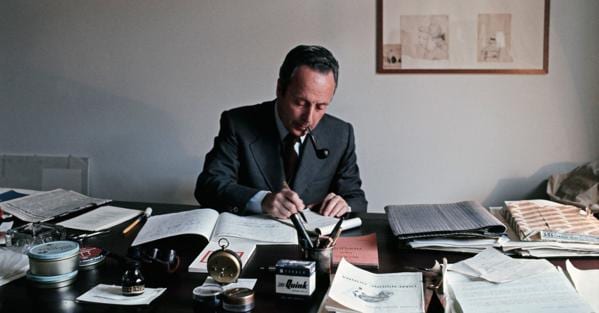Giorgio Bassani and his immortal word
[ad_1]
The immortal echo of Giorgio Bassani’s work, his uncompromising style, his intellectual honesty returned to New York, at the Italian Cultural Institute, with the seminar “A Man of Letters: Giorgio Bassani in North America”. The focus of the meeting was the presentation of Anna Dolfi, the greatest scholar of the Ferrarese writer and curator of the “Complete Poems” (Feltrinelli, 2021).
On the back cover we can see: “Really dear I could not tell you / through which / roads so far away / I managed to return after such / a long time”.
The entire body of poetry of the author
The volume in question collects and progressively explores the author’s entire poetic corpus, composed between 1945 and 1982, from which emerges an intimate, autobiographical temperament, with a watchful and severe gaze on post-war Italy. In the 1970s Bassani landed in the United States, invited as a “visiting professor” to the universities of Indiana, California and Canada. Here he restored the “Novel of Ferrara” and sketched the verses of “In great secret”, some of which he himself defined as his “American poems”. Dolfi’s next destination, introduced by his daughter Paola, president of the “Giorgio Bassani” Foundation, and by Valerio Capozzo, will be the Gabinetto Vieusseux of Florence.
Ferrara always
With a rigorous and illuminating curatorship, in the “Complete Poems” Dolfi follows Bassani’s pen from one work to another, in and out of each revised version, while incorporating the previous seasons by changing and losing much of himself. At each passage, the poet’s ego renounces its own subjectivity and, in an attempt to cross Ferrara again, projects buried images forward in space and backward in time, destined to resurface instantaneously and to vanish forever with rapid acceleration. Especially in Epitaffio (1974) familiar faces and places reappear, for one last time, but the ambiguous chauffeur at the wheel has already taken another existential direction. “Wide deserted streets / with no side roofs at all” accompany not only the passenger of a Rolls Royce and his fickle face (still attributable to the authorial will), but also the solitary wandering, on foot or by car, of an individual who can be defined on the basis of what it is not, with the clear and dramatic privative formula of the “without”. It is an ego that no longer has any hope, which has become the new protagonist of lyrics written with the conviction that nothingness is the only destiny.

An I lost in memory
A torn ego manifests itself which prefers not to open the very epistles to whose form, however, it entrusts its texts. With the letters apparently addressed to a ‘you’ that is difficult to identify, Bassani speaks to himself of all his loneliness, of boredom and of the fatal and controversial attraction for death. Having lost the usual places, in the course of “Lettera” the story places the ego in a modest hotel typologically similar to many others, especially that of the final stage of “L’airone” (1968). The protagonist of the opera realizes that around him there is no longer any life or movement, “nobody on the street”, the “doors and shutters regularly bolted”, as soon as he understands that what appears uncanny leads him back to the intimate, to the familiar, to the paternal image through what is different, “a grizzled gentleman about fifty-five”. This figure is, at the same time, the poet’s ego and his double, through which the author allows us to see and then hides his mental projections, the unspeakable functions of being and of his language. “The no man’s land evoked in “L’airone”, this desolate land that opens up just outside Ferrara and which Edgardo Limentani travels and measures in vain, is a large, immense cemetery: the cemetery of the world – argues Paola Bassani in the “Premise” – The no man’s land, so dear to the writer now and which inspires him this kind of anxiety, of obsessive visitation of the cemetery, feeds on the atmosphere and taste above all, primarily on a figurative level, then dominant in the United States” . THE
[ad_2]
Source link












